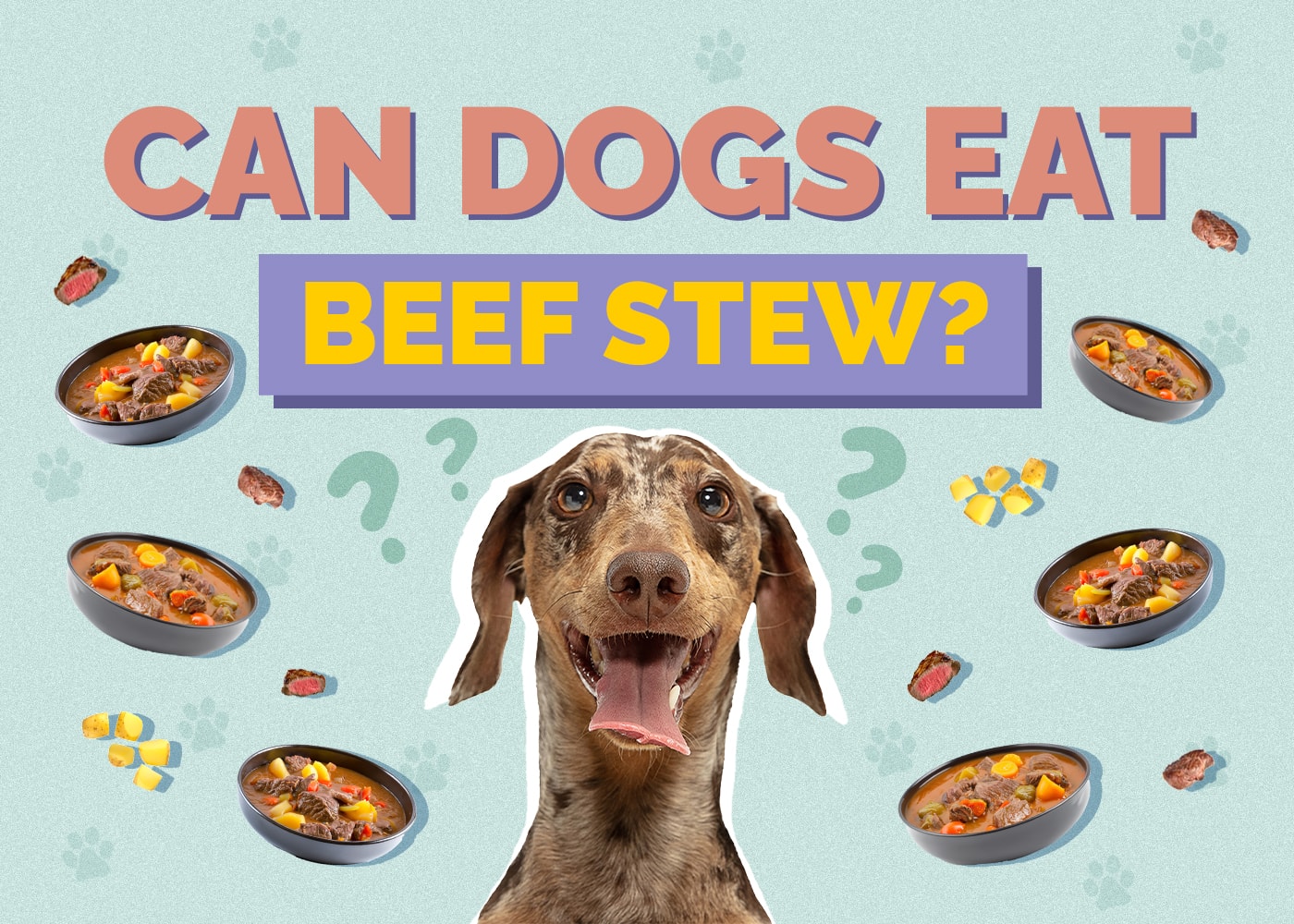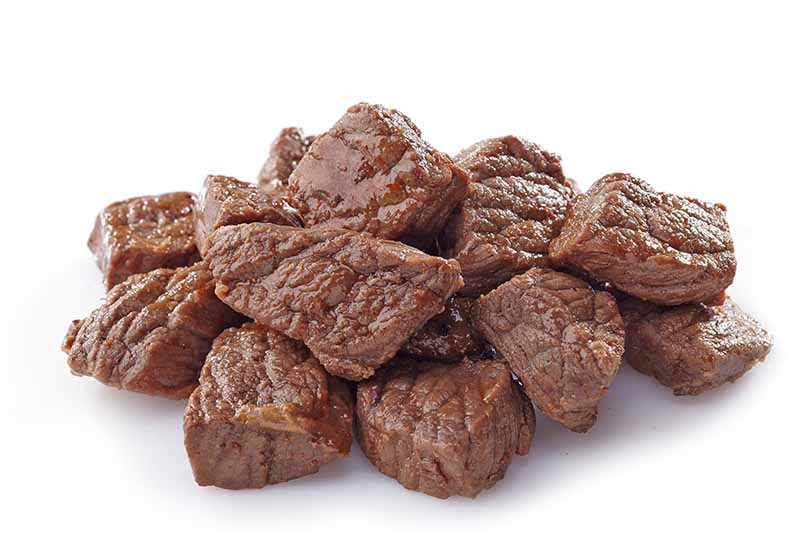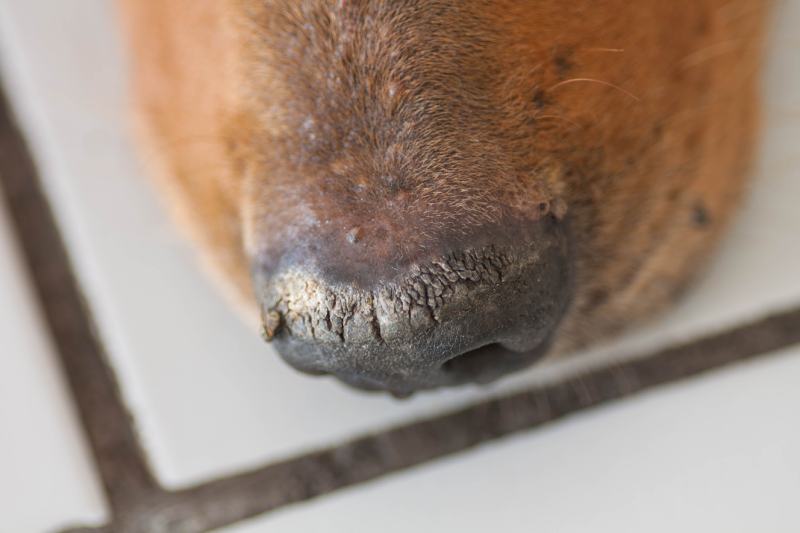Can Dogs Eat Beef Stew? Vet Reviewed Facts & FAQ

Updated on

Beef stew is a hearty and healthy meal, especially in the colder months when we can’t get enough. A pot of beef stew is prepared with nutritious ingredients, and sharing it with your dog sounds like a great dinner plan, right?
Right, you are! If beef stew is prepared without spices or ingredients that can be harmful to dogs, it can be a great source of nutrition. Although sharing a bit of your already-cooked beef stew may not cause any harm, it’s best to prepare your dog a suitable stew of its own that omits onions, spices, and garlic.
Can Dogs Eat Beef Stew?
Dogs can happily enjoy beef stew in moderation as long as it doesn’t contain any harmful or toxic ingredients. Beef stew recipes can range between cooks, but they all generally include a combination of vegetables, beef, and spice. A beef stew that is suitable for your dog to eat should not contain onions, garlic, or too much salt or spices.

Avoiding Onions and Garlic
Dogs should avoid eating any part of the onion, including powdered products, which are even more poisonous than fresh onions. N-propyl disulfide is a poisonous substance found in onions that makes red blood cells degrade, resulting in anemia. Garlic has the same effect as it is from the same family as onions.
According to studies, it takes between 15 and 30 grams of garlic per kilogram of body weight to have a harmful effect. To put that into perspective, an average garlic clove typically weighs 3–7 grams, so your dog would have to consume a large portion to become ill. However, some dogs are more sensitive than others, and a toxic dose of garlic spread over a few days can also be harmful.
Using Less Salt
While dogs need a certain amount of salt for their cells to function, too much can be harmful (and even toxic) , which can be a problem if you enjoy your beef stew on the salty side. Ingestion of too much salt in a beef stew can cause problems such as dehydration, vomiting and diarrhea. Other spices such as paprika, pepper, bay leaf, mustard seeds, and curry powder are not necessarily toxic but can be harmful in large amounts.
Selecting Lean Cuts
Finally, it’s crucial to check that the beef stew isn’t overly fatty because it can give dogs digestive problems. If your stew is cooked according to these guidelines, your dog should be able to enjoy it without any issues.
How Healthy Is Beef Stew for Dogs?
A typical beef stew contains ingredients that are very healthy and beneficial for your dog unless your dog suffers from a food allergy to beef or food intolerances to any of the other ingredients. The vegetables in beef stew include vitamins, minerals, and antioxidants, while beef is a good source of protein and fat. Also, your dog gets to try something new in addition to its regular diet.
Beef stew will usually include a variety of vegetables such as potatoes, carrots, parsnips, tomatoes, green beans, and of course, beef.
Potatoes
Potatoes are nutrient-dense and provide vitamin C, B6, iron, and magnesium, which can help support your dog’s immune and nervous systems. However, solanine is also present in potatoes and can be harmful to you when not cooked properly.
Compared to white potatoes, sweet potatoes are far more nutritional, making them the healthier choice. They contain vitamins C, and B6, potassium, magnesium, calcium, and iron.

Carrots
Carrots are safe and healthy for your dog and are often used in many dog food recipes. They include vitamins A, K, and B6. Calcium, iron, and potassium are high in fiber. They are beneficial for eye health and provide antioxidants for healthy skin and fur.
Tomatoes and Green Beans
Dogs can eat tomatoes in small amounts. Tomatoes contain fiber, which helps support your dog’s digestion. They also include antioxidants, vitamins C and B9 and potassium.
Green beans are abundant in essential vitamins and minerals, are high in fiber, and are low in calories, making them a healthy vegetable for your dog.
Beef
And finally, beef, the primary ingredient in beef stew, is extremely nutritious for your dog, unless they suffer from a food allergy to it. Beef is a common ingredient in dog foods and a great source of protein and contains vitamins and minerals that support your dog’s overall health.

Beef Stew Recipe for Dogs
Now you know that beef stew can be nutritious for your dog, given it excludes any harmful ingredients such as onions, garlic, and large amounts of salt, you may prefer to prepare your dog with its own pot of delicious beef stew. Here is a simple and tasty recipe that is easy to prepare.
- Lean beef
- Sweet potato
- Carrots
- Green beans
You will prepare your dog’s stew the same way you would but use low-sodium beef stock. You could serve this stew as a meal topper to kibble or on its own with a little rice as an occasional treat.
More Tips for a Healthy Diet
What you decide to feed your dog is very important to its overall health, especially when it comes to feeding it human foods. Dog-safe vegetables should be cooked without spices and should be prepared in small, bite-sized chunks.
The general rule of thumb is to not share food with your dogs, as you never know what ingredients are included, especially if you haven’t prepared the dish on your own. You should especially avoid highly processed, high-salt, and high-sugar foods.
A complete and balanced diet for your dog consists of protein, carbohydrates, fats, vitamins, and minerals. Fresh water is also essential at all times. Balanced dog food should also meet their energy requirements which may vary depending on growth, reproduction, age, activity levels, breed, and specific health conditions.
Many brands produce healthy dog food, and talking to your vet is the best way to ensure your dog receives a healthy, balanced, high-quality diet. Feeding an entirely home cooked diet to your dog can easily lead to deficiencies, unless following a meal plan from a veterinary nutritionist.
Conclusion
Your dog can eat beef stew as a treat if it contains no onion or garlic and your dog does not have any food allergies. Beef stew is generally prepared with garlic, onion, and staple ingredients, so if your pup eats a small portion of your stew, it should be okay, but you need to watch for any signs of toxicity. If you want to occasionally feed your dog beef stew, it can be beneficial to its health, and your dog will love the new addition to its diet, but it is recommended to prepare a special beef stew without any spices, onion, or garlic.
Also see:
- Can Dogs Eat Arugula? Vet-Reviewed Nutrition Facts & FAQ
- Can Dogs Eat Curry? Vet-Reviewed Nutrition Facts & FAQ
Featured Image Credit: Tatiana Volgutuva, Shutterstock











